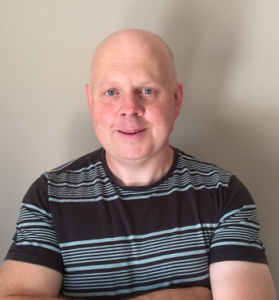How writing a fictional story is helping Matt kick goals in real life
How writing a fictional story is helping Matt kick goals in real life

By Matt Dunn
I have always loved writing. Though, it goes beyond that. I need writing.
The truth is, I have only recently worked out why. I had assumed the reason was about having that end product. In the case of fiction, it’s a world pulled from thin air. On that final page you can stand upon the apex of a metaphorical mountain, survey everything you’ve created, and proudly say, “Wow, look what I did!” It’s exciting, having the power to put people in situations of your choosing, elevating them and cutting them down at will. A god of the pages.
Of course, there’s more to it than that. I had never really considered or believed it before, but there is catharsis in writing. The process has definitely acted as therapy for me in recent times, helping me to not only express my feelings on certain issues, but to right the wrongs of the world (fictional though it may be). Let me explain my situation.
My day job became toxic
I began writing my novel manuscript Red Time straight after leaving work with a politician after an arduous four years. The job had been the most awful, toxic situation. I didn’t believe in the party, or the views of the man I was representing. I was silly enough to think I could work as a media adviser and remain detached from what it meant. It was fine for a while, but eventually I was coming to work every day with my stomach in a knot. It was a battleground. I lost sleep. I began to lose all sense of self. The constant daily grind of adhering to “the message” ran contrary to my truth-telling nature. At last, everything came to a head. It was time to move on.
Would I lose my home?
There was no escaping the fact, however, that I was the main breadwinner to a large family. Mortgage payments loomed and all the other realities of living in the country and being unemployed at 46 years of age dogged me. I’ve never really been obsessed by money, but I didn’t have the luxury of ignoring it either. My wife began to ask, “Will we lose our home?” Given the dearth of work opportunities about, it seemed a real prospect.
Finding my way through writing
The writing was a luxury and also a way of denying the precarious situation I’d found myself in (or, more to the point, the precarious situation I’d plunged my family into). The deeper I got into the story, though, the less I wanted to find other work.
Everything else became an unwelcome distraction from the fictional world of Aussie rules footballer Mick Stewart, who was looking for salvation after a life on the road bouncing from club to club. Mick, very much like me, was searching for something his life had yet to yield. The novel became instructional for me too. I decided, like Mick, I was in my own version of Red Time (“…that moment when you seize the opportunity put before you and make the right decision for yours and everybody else’s future”).
In the novel, Red Time is defined in a few slightly different ways, but essentially it’s the time when you’re under pressure and the clock is running against you. You have time, but not much. Decisions are critical. It’s time to seize the moment. The concept applies well to sport, obviously, but also applies well to life.
As gut wrenching as my recent work history had been – not to mention my unemployment history – I needed to salvage something from the situation. I really did feel like the clock was ticking. There was no time to waste. I dived right in.
My characters allowed me to shape my story
I believe, in retrospect, that my characters were placed in certain predicaments to help me explore and resolve my own feelings on particular issues. I’m shaping the story, but the story is also shaping me. For instance, Mick is reeling from the aftermath of the most tragic childhood, where his mother was too often the target of attacks by a crazed partner.
Violence was something I was happily spared growing up, though my father’s own boy time experience mirrors some of things that occur in Red Time. I always wanted to know what it was like for him, how those childhood traumas affected him as he moved into adulthood. As it happened, my father’s mother packed up the house in Melbourne in one frenzied morning and moved to Sydney with my dad and his sister, leaving her shocked husband to return from work to an empty abode. She never looked back. Not that I want to give too much away, but one of my characters may be inspired to do something similar.
The story of grandmother’s escape was one I carried with me into my own adulthood life. My grandfather, as it happened, went blind (from heavy drinking, so the story went). I never met him. Dad spent some time with his father years later, but said he felt nothing for the man. I know, however, that those incidents from his childhood shaped both our lives in some way. The years cannot dilute all traumas.
Letting it all out safely
What was unquestionable catharsis for me was creating Brian Rankin, an evil Senator and football club president, who exploits every lurk and perk under the sun – not to mention using and abusing just about everyone with whom he comes into contact.
I should put in a disclaimer here. He is no one I have ever worked for or come into contact with in the political realm, but rather the embodiment of a political system that can sometimes promote questionable morals. I owe Brian the highest debt of gratitude, since he, above all other characters, has helped me move on with my life.
On my own road again
I’m happy to say I have found work again as a journalist at a country newspaper. It’s a blessed profession. I have high hopes for Red Time. If it doesn’t hit the bestseller list, though, I won’t be too disappointed. The writing process gave me a lot at a time when I really needed something. Now, on the other side, I feel like have healed myself (maybe not totally, but people, like novel manuscripts, are always ‘works in progress”).
As far as healing goes, I don’t think it really matters whether you write something publishable. Everyone’s writing journey is different. Writing for its own sake is always of value. It’s a way of knowing yourself better and clarifying your insights. It’s a way of celebrating what it means to be you. It’s something everyone should do.
About Matt
I drifted in my early twenties, as many of us do. Although I held strong to the idea of writing for a living, I ended up working on the railways in Footscray (Melbourne, Australia) as a crane driver and forklift driver. It was a solid income and the people were great, but it wasn’t where I was meant to be. Despite that fact, I stayed there for 13 years. I became quite despondent at my situation, but eventually obtained a Bachelor of Journalism degree through part time study.
The degree led to work on a country newspaper, then freelance articles at some big metropolitan dailies, and Australian Geographic. I may have taken a “wrong turn” getting into politics, but it helped to inspire Red Time, so I’m claiming it as a positive experience.
Now the biggest part of this book journey begins – the search for a publisher. Email: dunnydogood@gmail.com
* Have you found writing a fictional story or writing poetry to be cathartic in some way? If so, you are invited to share your story with Dear Diary. Write to june@junealexander.com





